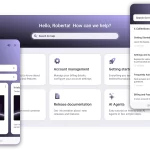Sure! Here’s the continuation of the article:
Introduction:
In today’s fast-paced digital landscape, startup success is often synonymous with the rise of innovative app startups. These tech-driven ventures are reshaping industries and revolutionizing the way we interact with the world around us. From fitness to finance, entertainment to education, app startups have become central players in driving digital transformation. They create solutions that not only simplify everyday tasks but also open doors to new opportunities, catering to an ever-growing mobile-first audience.
Why are App Startups So Popular?

There are several reasons why app startups have gained immense popularity in recent years:
- Mobile-First World
With over 6.5 billion smartphone users worldwide, mobile devices have become the go-to platform for everything from communication to entertainment. This global shift to mobile-first experiences has created a massive market for apps, making it easier for startups to attract users and investors. - Low Startup Costs
Compared to traditional businesses, the cost of starting an app-based business is relatively low. Developers can design and launch a functional app with minimal overhead expenses, especially with the availability of open-source tools, cloud computing, and app-building platforms. - Scalability
App startups have the potential to scale rapidly. A successful app can reach millions of users worldwide, creating the opportunity for exponential growth. With a strong business model, apps can monetize through various channels such as subscriptions, in-app purchases, or advertisements. - Global Reach
Unlike traditional brick-and-mortar businesses, apps can transcend geographical boundaries. By reaching global audiences, startups can tap into a vast customer base, expand rapidly, and build a loyal following. - Innovation and Disruption
App startups are often at the forefront of innovation. They solve unique problems, streamline existing processes, and even disrupt entire industries. Whether it’s transforming healthcare, changing the way we order food, or reimagining transportation, app startups are playing a pivotal role in modernizing businesses and improving user experiences.
Key Factors Behind the Success of App Startups

While the opportunities are vast, not all app startups succeed. To build a successful app startup, there are several key factors to consider:
-
Solving a Real Problem
Successful apps often arise from identifying a problem and providing a simple, effective solution. Whether it’s making daily tasks easier, improving productivity, or enhancing entertainment experiences, successful app startups always have a clear value proposition for users. -
User-Centric Design
The user experience (UX) is crucial in the success of an app. A clean, intuitive interface combined with seamless functionality ensures that users enjoy using the app. Startups that focus on understanding the needs and pain points of their target audience are more likely to retain users and grow rapidly. -
Marketing and Growth Strategy
No matter how innovative an app is, it won’t succeed without effective marketing. App startups need to build a solid marketing strategy that includes app store optimization (ASO), digital marketing campaigns, partnerships, and influencer collaborations. Organic growth through word-of-mouth and referrals is often a key driver for many successful apps. -
Monetization Strategy
A solid monetization strategy is essential for sustaining an app startup. Whether through paid subscriptions, in-app purchases, advertisements, or premium features, knowing how to generate revenue while maintaining a positive user experience is critical to startup success. -
Adaptability and Continuous Improvement
Technology and user expectations evolve constantly. Successful app startups are those that listen to feedback, iterate on their app’s features, and adapt to market trends. Keeping the app fresh and relevant through updates, bug fixes, and new features helps retain users and attract new ones.
Examples of Successful App Startups

Several app startups have become household names in recent years, demonstrating the potential for success in this space. Some of the most notable examples include:
- Uber
Initially launched as a ride-hailing app, Uber revolutionized transportation and became a global brand. The company has expanded its services to include food delivery (Uber Eats), freight logistics, and even self-driving cars, showing the scalability and adaptability of app startups. - Airbnb
What began as an app for renting spare rooms has grown into a global platform for short-term lodging. Airbnb disrupted the hotel industry and created a new way for people to experience travel. - TikTok
TikTok started as a short-form video platform but quickly gained popularity worldwide, turning into one of the most influential social media platforms. TikTok’s success lies in its algorithmic approach to content discovery and its focus on user-generated content. - Stripe
Stripe is a payment processing platform that has made it easier for businesses of all sizes to accept payments online. Its developer-friendly tools and APIs have revolutionized the financial tech industry, turning Stripe into one of the most successful app startups in the world.
Challenges Faced by App Startups
Despite the many advantages, app startups also face a range of challenges. Some of the most common hurdles include:
- Competition
The app market is highly competitive, with millions of apps available for download. Standing out among the noise requires creativity, differentiation, and a compelling value proposition. - User Acquisition and Retention
Attracting and retaining users can be difficult. Many apps struggle with high churn rates, where users abandon the app after a short period. Engaging users with regular updates, personalized experiences, and great customer support is key to success. - Funding
Securing funding to develop and scale an app startup can be challenging. Many app startups rely on venture capital or angel investors to support their growth. Having a solid business model and demonstrating user demand are crucial to attracting investors. - Technology and Security
As apps grow, so does the complexity of their infrastructure. App startups must ensure their technology stack can scale effectively while also protecting user data and maintaining high security standards. Cybersecurity issues, such as data breaches, can severely damage an app’s reputation.
The Future of App Startups
As technology continues to evolve, the future for app startups looks incredibly promising. With the rise of artificial intelligence, machine learning, and augmented reality, app startups will have more opportunities to create innovative products and services. The growing demand for personalized experiences, sustainability, and digital transformation will likely fuel the growth of app startups in various sectors.
For aspiring entrepreneurs, the app startup ecosystem remains an exciting and rewarding space to explore. With the right idea, a solid execution plan, and a user-first approach, building a successful app startup is not only possible—it is the future of business.
I hope this helps! Let me know if you’d like to add or adjust anything further.






















